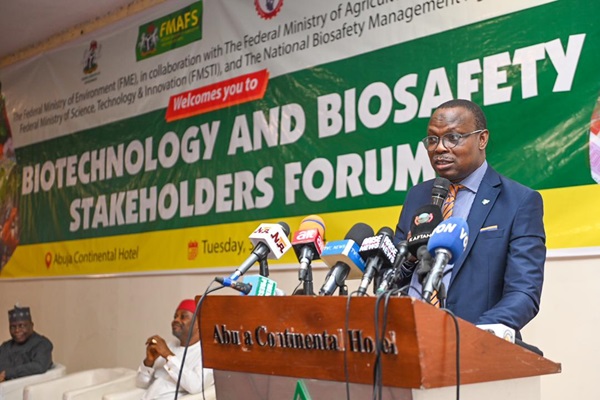
The Minister of State for Environment, Dr. Iziaq Salako, has revealed that the government is deeply committed to the vision of President Bola Tinubu GCFR and confident in the ability of the National Biosafety Management Agency (NBMA) to regulate modern biotechnological innovations in the country, which bring about genetically modified organisms (GMOs).
According to Salako, who was speaking at a stakeholders’ meeting on Biosafety and Biotechnology held in Abuja, the NBMA is actively regulating modern biotechnology activities to ensure biosecurity across Nigeria.
Salako highlighted the pivotal role of the NBMA, emphasising its three fundamental pillars: risk assessment and management, regulatory fidelity and public engagement. He reiterated the ministry’s dedication to President Bola Tinubu’s vision of remodeling the Nigerian economy for growth, development, job creation, food security and poverty alleviation, stressing the importance of deploying modern biotechnology solutions grounded in scientific evidence, ethical practices, safety and freedom of choice.
Moreover, Salako underscored the transformative impact of biotechnology on various sectors, including agriculture, healthcare and environmental conservation. He emphasised its contribution to reducing pesticide usage, preserving biodiversity, combating erosion and greenhouse gas emissions, enhancing tolerance to climatic extremes and improving nutrition and healthcare outcomes.
Salako emphasised that biotechnology is more than just policy or regulations; it is a commitment to responsible stewardship of life itself, guided by factual evidence rather than commercial interests. He urged stakeholders to support the NBMA’s regulatory functions through collaboration, information sharing and expert opinions, while promoting informed dialogue based on scientific evidence rather than sensationalism or misinformation.
Furthermore, he commended the NBMA’s diligence since its establishment in 2015 in safeguarding human health and the environment from potential risks associated with modern biotechnology, in compliance with international standards such as the Cartagena Protocol on Biosafety.
The director-general of NBMA, Dr. Agnes Asagbra echoed the agency’s commitment to providing a robust regulatory framework to ensure the safe application of biotechnology and the protection of biodiversity. She emphasised the agency’s mandate to oversee the use of genetically modified organisms (GMOs) and ensure they do not pose risks to human health, plant life, animals or the environment.
Asagbra highlighted the NBMA’s multifaceted approach, encompassing rigorous assessments of GMOs, public awareness campaigns and the establishment of a comprehensive regulatory framework aligned with international best practices. She urged participants to collaborate in turning challenges into opportunities and ensuring that the benefits of safe modern biotechnology reach all segments of society.
Asagbra called for reflection on past accomplishments and collective deliberation on how to further enhance biosafety for the nation’s prosperity. She emphasised the need to navigate the complexities of modern biotechnology while capitalising on its vast potential for societal betterment.
The Federal Government, through the NBMA, reaffirmed its commitment to regulating modern biotechnology responsibly, ensuring biosafety and harnessing its potential for national development and prosperity.

